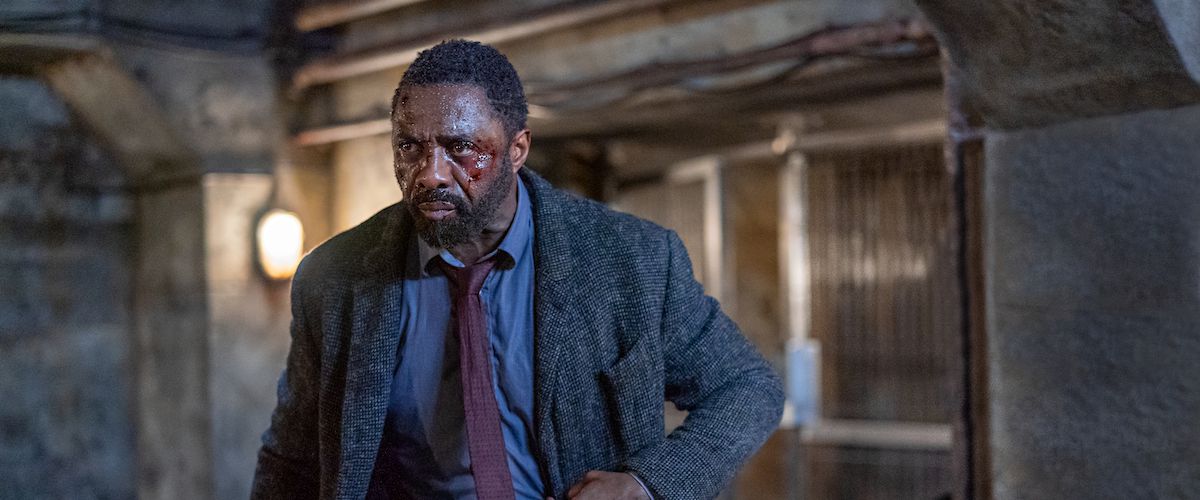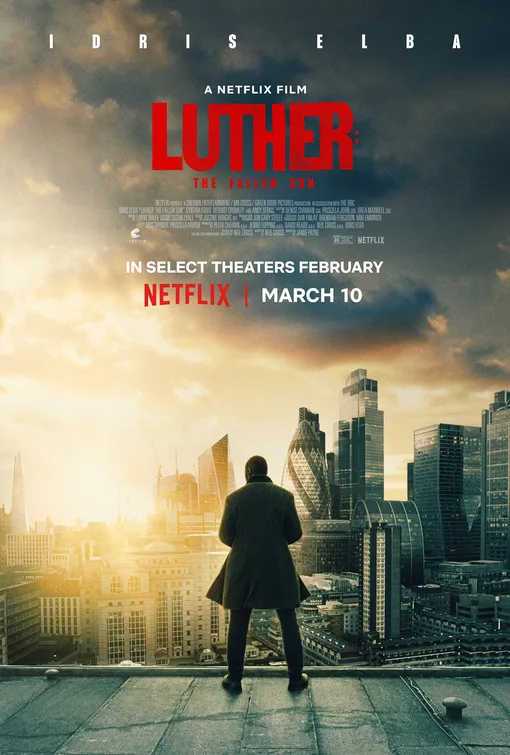Idris Elba doesn’t need James Bond. He has John Luther.
Having officially ruled out playing 007 in a recent interview, the suave British actor instead slips back into a role he’s inhabited on television for nearly a decade with “Luther: The Fallen Sun,” a feature-length continuation of the BBC crime drama (in theaters this week, then streaming on Netflix March 10), redirecting the online furor of his fan-casting to a similarly preposterous role that’s already, iconically, his own.
In Detective Chief Inspector John Luther, a renegade copper investigating London’s grisliest homicides, Elba has established an enduring hero, whose characteristic shades of gray—from his long wool overcoat to his moral compass—feel at once classical and tailored to fit. Squinting and shambling through horrific crime scenes with his hands in his pockets, Luther was styled after both Columbo and Sherlock Holmes, but it’s Elba’s mercurial screen presence, all rumpled gravitas and movie-star smolder, that fills out the character with something special.
Brilliant and troubled, rough and ready, on the edge of darkness, Luther is a larger-than-life protagonist, the type of intensely brooding detective who’s willing to skirt any rule if it catches him a killer, whose uncompromising sense of justice puts him at odds with colleagues. (None of them can claim to keep as cool a head whilst dangling a suspected witness over a balcony to extract key information.) Elba embodies Luther’s psychological torment—he breaks the law in order to uphold it—in soulful fashion; he’s the kind of endlessly compelling screen presence who can burrow into an archetype and illuminate inner currents of passion, rage, and pain without making the obvious choice, without even seeming to lower the character’s ever-present guard. All five series of “Luther” to date represent the actor at his best, and one of the chief pleasures of “The Fallen Sun” is the comfort and staggering charisma with which he shrugs that signature coat over his impossibly broad shoulders and heads back to work.
Last seen cuffed by his former police superintendent, Martin Schenk (Dermot Crowley), after crossing one extralegal line too many in the show’s fifth series finale, Luther finds himself in prison at the start of “The Fallen Sun,” though the circumstances of his incarceration have been altered. In the film’s telling, the good detective’s investigation into the disappearance of a young janitor has led his latest adversary—a teeth-gnashing ghoul of a tech billionaire played by Andy Serkis—to leak a dossier to the media that incriminates Luther in a litany of rule-bending offenses, from breaking and entering to suspect intimidation, tampering with evidence, and bribery. (Luther’s guilty on all charges, naturally, but he has a perfectly reasonable explanation, if only the courts would hear him out.)
Though stuck behind bars, Luther is still top of mind for Serkis’ aforementioned ghoul, David Robey, who terrorizes London through a series of elaborate killings—such as that of eight strangers, abducted, hanged, and arranged in a manor that erupts into flame as the victims’ parents arrive—but still makes time to taunt Luther over his failure to prevent the carnage. In response, Luther breaks out during a prison transport, after a kerosene-soaked cellblock-riot sequence makes his transfer to another facility inevitable. The sight of Luther shielding himself with a flaming mattress as he brawls down a corridor of bloodthirsty inmates marks “The Fallen Sun” early on as an escalation of the series’ penchant for pulp theatrics.
Back on the rain-slicked streets of London, Luther hunts for clues as to Robey’s next atrocity exhibition, even as he’s hunted by his former colleagues on the police force, including replacement DCI Odette Raine (Cynthia Erivo) and Schenk, consulting for the department as the authority on all things Luther. This setup is nothing new for “Luther,” which had Elba’s hero on the lam from police by the end of its first series. But there’s a sense of weariness to this latest runabout that feels cumulative—though “The Fallen Sun” is consciously framed as a cinematic reintroduction for the character, understanding the detective’s sordid history with seductive psychopath and potential soulmate Alice Morgan (Ruth Wilson), as well as the assorted supporting players who’ve paid the price for allying themselves with Luther, will be of value to viewers curious as to the air of haunted melancholy that hangs heavy around the character. He’s made decisions before, terrible ones, and he lives alone with their consequences.
Luther’s right at home in the film’s gloomy, gothic version of London, in which every darkened alleyway and unguarded suburban milieu is stalked by members of a rogues’ gallery twisted enough to make Batman blink. There are evil occultists who kidnap young mothers to drain their blood, masked fetishists who wait under victims’ beds only to silently snake out into view once the lights are out, even clown-masked killers who attack women making their way home alone at night. The adversaries Luther faces are super-criminals, agents of terror, turning his city into a Gotham-esque urban sprawl of fear and depravity even as they justify his own vigilantism.
Best known for motion-captured performances that surface the humanity of sophisticated animals, Serkis is no less compelling as a sadistic wolf in sheep’s clothing, an omniscient one-percenter whose reach will never exceed his grasp. Heading a blackmailing operation that has insulated him with an army of henchmen, all victims scared their own darkest secrets will get out, Robey is a ludicrous megalomaniac even before it’s revealed he maintains a Norwegian lair befitting a Bond villain—one none-too-subtle touch that, in keeping with the film’s impressive budget, elevates Luther out of his already-heightened pulp surroundings and into a more winkingly silly action sandbox. As a series, “Luther” often dealt in extremes, pitting Elba’s relentless vigilante against all manner of depraved psychopaths as if to test his outer limits; faced with a cartoonishly cruel archvillain like this, Luther’s eventual admission to a reproachful former colleague that he broke the law because he “couldn’t see any other way to do what had to be done” registers more as a hero’s mantra than a confession of past crimes.
Returning director Jamie Payne (who helmed Series 5) extends the stark and amplified atmosphere of his past “Luther” installments even as the action set pieces—one turning Piccadilly Square into a warzone; another leaving London to explore a frozen house of horrors—scale up, with veteran cinematographer Larry Smith bathing the film’s eeriest tableaux of domestic terror in a cold, suffusing twilight. As in previous installments of the series, Luther’s red tie—a signature accessory—is sometimes the brightest splash of color on the screen. Neil Cross, the series creator and sole writer, scripts “Luther” with a sensibility so menacing and lurid that it approaches the gritty camp of recent DC superhero films, a sensation that Lorne Balfe’s taut, pulsing score only enhances.
For all its glowering atmosphere and hard-boiled dialogue, though, most central to the film’s pleasures are the unerring instincts of its actors, some returning to roles they’ve been playing for a decade. When Elba shares the screen with Dermot Crowley, as former superintendent Martin Schenk, both actors bat self-serious cornball dialogue around with the steady rhythm and good humor of seasoned scene partners. They’re professionals at work, with a nasty job ahead of them. Erivo, too, fits comfortably into the equation as a detective initially tasked with tracking down Luther, supplying the matter-of-fact gravitas needed to go toe-to-toe with the hero, even if the requisite third-act twist that partners them up is a little too far-fetched, even by the film’s graphic-novel logic.
That “The Fallen Sun” ultimately feels more episodic than climactic is by design; Elba has made no secret of his desire to play Luther on the big screen in a series of films, of which this is only the first. Soon available on Netflix alongside the rest of the TV series, “The Fallen Sun” is a natural continuation for fans but also presents a way in for series newcomers, even sending the character off in a new direction that playfully acknowledges Elba’s Bond bona fides while asserting, not unconvincingly, that Luther’s world is quite enough.
“Luther: The Fallen Sun” is in select theaters this Friday and streaming on Netflix March 10




















